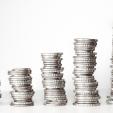Dollar slips, yields rise on slowing U.S. economic data
NEW YORK (Aug 24) - The dollar eased and yields at first fell on Tuesday as data showing slower economic growth raised initial hopes the Federal Reserve will back off its aggressive hiking of interest rates at its banking symposium at Jackson Hole on Friday.
But yields later rose and stocks dipped as the Fed's hawkish message held greater sway.
Gold snapped a six-session losing streak as the dollar weakened while oil rose almost 4% after Saudi Arabia floated the idea of output cuts from the Organization of the Petroleum Exporting Countries and its allies.
Sales of new U.S. single-family homes plunged to a 6-1/2-year low in July while a survey from S&P Global showed its measure of private sector business activity fell to a 27-month low, suggesting Fed efforts to tame inflation were working.
"The animal spirits were better for risk over the summer based on the view that we were near the end of the hiking cycle," said Marvin Loh, senior global market strategist at State Street in Boston, adding that view is no longer widely held.
The Fed is faced with changing the market's view without significantly altering its projections when policymakers meet in Jackson Hole, Wyoming.
"The Fed has been fairly consistent in trying to sound as hawkish as it can," Loh said. "Instead of fighting the Fed, I think the market is in complete agreement with the Fed."
The U.S. economy looks to be headed into another energy price shock in the winter, with natural gas prices at their highest since 2008, said Bill Adams, chief economist for Comerica Bank in Dallas.
With demand cooling, another big negative shock looks likely and a recession is also more likely than not between now and mid-2023, if one is not already underway, Adams said.
The Dow Jones Industrial Average (.DJI) fell 0.37%, the S&P 500 (.SPX) lost 0.03% and the Nasdaq Composite (.IXIC) added 0.29%.
The dollar index fell 0.358% as the euro rebounded, rising 0.19% to $0.996 and The yield on 10-year Treasury notes was up 1.3 basis points to 3.048%.
Earlier the euro fell to fresh two-decade lows after data showed euro zone business activity contracted for a second straight month in August as the war in Ukraine is expected to ensure the outlook for the European economy remains bleak.
China's yuan weakened to a two-year low and sterling briefly touched its weakest since March 2020 benefited the dollar.
While the S&P flash composite Purchasing Managers' Index (PMI) of business activity in Europe was not as bad as feared, analysts said more grim news for the economy is likely given how gas prices have surged to record highs ahead of winter. read more
MSCI's global stock index (.MIWD00000PUS) slid 0.14%, while the STOXX (.STOXX) index of European company shares closed down 0.42%, having fallen for nearly a week.
Benchmark gas prices in the European Union surged 13% overnight to a record peak, having doubled in just a month to be 14 times higher than the average of the past decade.
Europe was braced for fresh disruption in energy supplies from Russia. read more
"I can't see the Ukraine war coming to an end anytime soon, that would be the catalyst for a market rally. That is going to keep pressure on energy prices and as for the euro, the only way is down," said Michael Hewson, chief markets at CMC Markets.
Stocks had begun to recover on bets the Fed would pivot next year away from its rate rising path.
Markets have see-sawed on whether the Fed will raise rates by 50 or 75 basis points next month. The probability of a 75 basis point hike reversed to 52.5% and the smaller hike is now 47.5%.
KITCO













